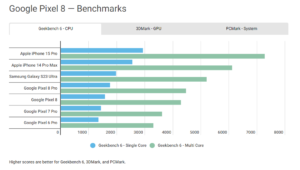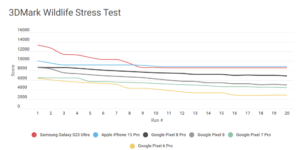The highly anticipated Google Pixel 8 has finally made its debut, and it brings a mix of new features and hardware improvements to the table. But the burning question on everyone’s mind is, can it really stand the test of time for seven years, as Google promises? In this comprehensive review, we’ll delve into the Pixel 8’s capabilities, its value proposition, and whether it truly justifies its higher price tag.
A Costly Affair
With a new and slightly higher price tag of $699, the Google Pixel 8 has upped the ante from its predecessor, making it $100 more expensive. The question remains, can it deliver on this added cost, or is it setting itself up for early obsolescence? Let’s explore its key features and see if it’s worth the investment.
Google Pixel 8: At a Glance
The Google Pixel 8 is positioned as a more affordable alternative to the powerhouse Pixel 8 Pro. It builds upon last year’s Pixel 7 with some notable hardware and software enhancements, but this comes with a higher entry price. You can purchase the Pixel 8 directly from the Google Store, Amazon, major electronics retailers, and various US carriers, including AT&T, T-Mobile, and Verizon.
Putting It to the Test
We put the Google Pixel 8 through its paces over a week of rigorous testing. The review unit was obtained directly from the Android Authority team. Let’s examine the phone’s performance, build quality, and its unique selling points.
The Good and the Not-So-Good
On the plus side, the Pixel 8 boasts Gorilla Glass Victus on both the front and back, offering robust protection against life’s mishaps. It’s IP68-rated, which means it can withstand dust and water exposure. While a protective case is always advisable, the phone’s initial durability is reassuring. The inclusion of Bluetooth 5.3, Wi-Fi 7, and 5G connectivity ensures blazing-fast internet speeds, making it future-ready.
![]() The Pixel 8 also addresses some issues seen in previous models. It shaves off about 20-25 minutes from its full-charge time, making shorter top-ups more convenient. The addition of Adaptive Charging helps prolong battery life, although it’s clear that over a seven-year period, you might need a battery replacement. The move to a 120Hz variable refresh rate display enhances the user experience, but it doesn’t offer the power-saving capabilities of the best flagship phones.
The Pixel 8 also addresses some issues seen in previous models. It shaves off about 20-25 minutes from its full-charge time, making shorter top-ups more convenient. The addition of Adaptive Charging helps prolong battery life, although it’s clear that over a seven-year period, you might need a battery replacement. The move to a 120Hz variable refresh rate display enhances the user experience, but it doesn’t offer the power-saving capabilities of the best flagship phones.
A Mixed Bag of Cameras
The Google Pixel 8’s camera system is impressive but not without its limitations. The 50MP primary camera, with its wider aperture, excels in HDR, low-light photography, and color accuracy, maintaining its reputation as one of the best in its class. However, Google has kept certain shooting controls and Video Boost exclusive to the more expensive Pro model, leaving users of the Pixel 8 wanting more. Nevertheless, new features like Magic Editor and Audio Magic Eraser keep the camera package competitive.
On the downside, the 12MP ultrawide camera disappoints with some distortion at the edges and noise in low light conditions. While the wider field of view is an improvement, it still lacks the quality of a dedicated telephoto lens, which is noticeably absent.
Questioning Longevity
Digging deeper into the hardware, we find some concerns about the Pixel 8’s long-term durability. The use of UFS 3.1 memory, while fast for large file transfers, falls short in random I/O, potentially affecting future app and game load times. With 8GB of RAM, it’s suitable for daily tasks but could become a limitation as the market evolves towards on-device AI. 
The Tensor G3 processor, while capable for daily tasks, falls behind flagship rivals, particularly for gaming. Gamers may find the chip’s limitations more pronounced, especially as the demand for high-end gaming increases. The absence of ray tracing technology further hints that the Pixel 8 may not be future-proof for gaming enthusiasts.
Seven-Year Support
Google’s promise of seven years of software updates is indeed enticing, but there’s a caveat. Google has a history of discontinuing features and struggling to bring them back to older devices. It’s likely that the Pixel 8 will lag behind the latest and greatest Google features, as it’s already one step behind the 8 Pro in terms of exclusive features.
The Verdict
 In summary, the Google Pixel 8 is a solid smartphone with remarkable features for the average user. It caters to social use, email, and casual photography, making it an excellent choice for many. However, it falls short of being a future-proof device for demanding users, gamers, and avid photographers who plan to keep their phones for the long haul. The hardware, while commendable, may not withstand the test of time for seven years.
In summary, the Google Pixel 8 is a solid smartphone with remarkable features for the average user. It caters to social use, email, and casual photography, making it an excellent choice for many. However, it falls short of being a future-proof device for demanding users, gamers, and avid photographers who plan to keep their phones for the long haul. The hardware, while commendable, may not withstand the test of time for seven years.
If you typically upgrade your phone every five years, the Pixel 8 remains an excellent choice for the present and the near future. But if you’re looking for a smartphone that will last you a full seven years, you might want to think twice. While Google’s seven-year update promise is enticing, it doesn’t guarantee access to all the latest features and advancements in the ever-evolving world of AI and technology. Choose the Pixel 8 with realistic expectations, and it will serve you well.










